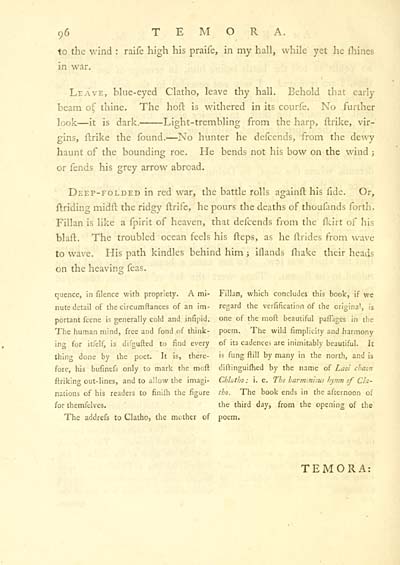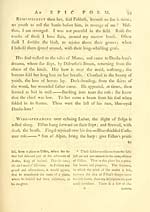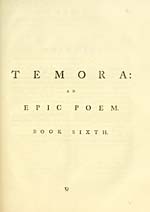Download files
Complete book:
Individual page:
Thumbnail gallery: Grid view | List view

96 T E M O R A.
to the wind : raife high his praife, in my hall, while yet he fliines
in war.
Leave, blue-eyed Clatho, leave thy hall. Behold that early
beam of thine. The hoft is withered in its courfe. No further
look — it is dark. Light-trembling from the harp, ftrike, vir-
gins, ftrike the found. — No hunter he defcends, from the dewy
haunt of the bounding roe. He bends not his bow on the wind ;
or fends his grey arrow abroad.
Deep-folded in red war, the battle rolls againfl: his fide. Or,
ftriding midft the ridgy ftrifc, he pours the deaths of thoufmds forth.
Fillan is like a fpirit of heaven, that defcends from the fkirt of his
blaft. The troubled ocean feels his fteps, as he ftrides from wave
to wave. His path kindles behind him ; iflands fliake their heads
on the heavinsf feas.
quence, in filence with propriety. A mi-
nute detail of the circumftances of an im-
portant fcene is generally cold and infipid.
The human mind, free and fond of think-
ing for itfelf, is difgufted to find every
thing done by the poet. It is, there-
fore, his bufmefs only to mark the moft
ftriking out-lines, and to allow the imagi-
nations of his readers to finifh the figure
for themfelves.
The addrefs to Clatho, the nu ther of
Fillan, which concludes this book, if we
regard the verfification of the origina', is
one of the moft beautiful pafTages in the
poem. The wild fimplicity and harmony
of its cadence; are inimitably beautiful. It
is fung ftill by many in the north, and is
diftinguilhed by the name of Laoi chaon
Chlatho : i. e. The harrrt'M-Ms hymn of Cla-
tho. The book ends in the afternoon of
the third day, from the opening of the
poem.
TEMORA:
to the wind : raife high his praife, in my hall, while yet he fliines
in war.
Leave, blue-eyed Clatho, leave thy hall. Behold that early
beam of thine. The hoft is withered in its courfe. No further
look — it is dark. Light-trembling from the harp, ftrike, vir-
gins, ftrike the found. — No hunter he defcends, from the dewy
haunt of the bounding roe. He bends not his bow on the wind ;
or fends his grey arrow abroad.
Deep-folded in red war, the battle rolls againfl: his fide. Or,
ftriding midft the ridgy ftrifc, he pours the deaths of thoufmds forth.
Fillan is like a fpirit of heaven, that defcends from the fkirt of his
blaft. The troubled ocean feels his fteps, as he ftrides from wave
to wave. His path kindles behind him ; iflands fliake their heads
on the heavinsf feas.
quence, in filence with propriety. A mi-
nute detail of the circumftances of an im-
portant fcene is generally cold and infipid.
The human mind, free and fond of think-
ing for itfelf, is difgufted to find every
thing done by the poet. It is, there-
fore, his bufmefs only to mark the moft
ftriking out-lines, and to allow the imagi-
nations of his readers to finifh the figure
for themfelves.
The addrefs to Clatho, the nu ther of
Fillan, which concludes this book, if we
regard the verfification of the origina', is
one of the moft beautiful pafTages in the
poem. The wild fimplicity and harmony
of its cadence; are inimitably beautiful. It
is fung ftill by many in the north, and is
diftinguilhed by the name of Laoi chaon
Chlatho : i. e. The harrrt'M-Ms hymn of Cla-
tho. The book ends in the afternoon of
the third day, from the opening of the
poem.
TEMORA:
Set display mode to: Large image | Transcription
Images and transcriptions on this page, including medium image downloads, may be used under the Creative Commons Attribution 4.0 International Licence unless otherwise stated. ![]()
| Early Gaelic Book Collections > Ossian Collection > Temora, an ancient epic poem, in eight books > (140) |
|---|
| Permanent URL | https://digital.nls.uk/82191398 |
|---|
| Description | Selected books from the Ossian Collection of 327 volumes, originally assembled by J. Norman Methven of Perth. Different editions and translations of James MacPherson's epic poem 'Ossian', some with a map of the 'Kingdom of Connor'. Also secondary material relating to Ossianic poetry and the Ossian controversy. |
|---|
| Description | Selected items from five 'Special and Named Printed Collections'. Includes books in Gaelic and other Celtic languages, works about the Gaels, their languages, literature, culture and history. |
|---|

